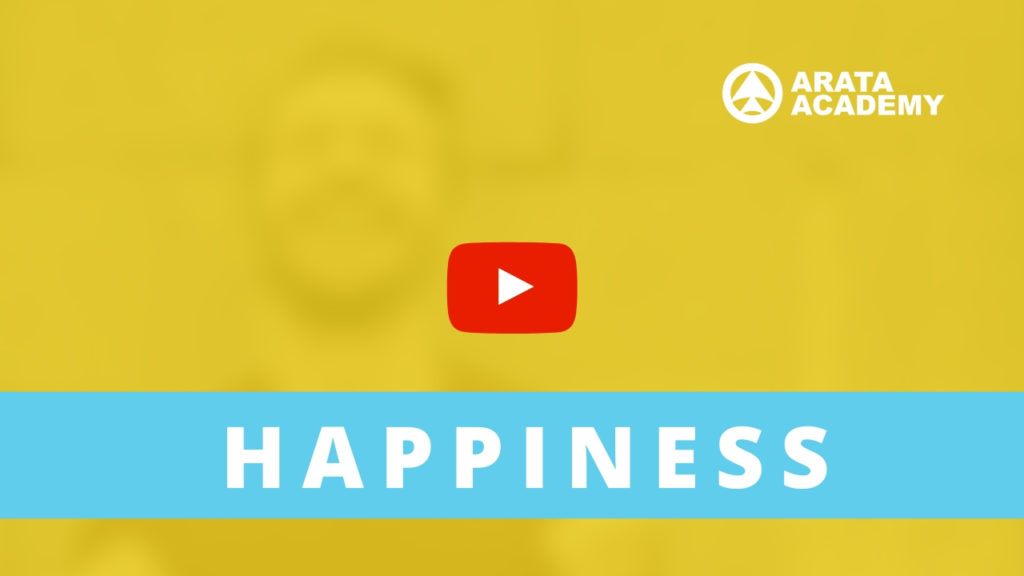Hello! Seiiti Arata. One in three people is always feeling unhappy, stressed, worried and even angry. The number of people who report nervousness, anxiety, sadness and concern is increasing. Do you find it difficult to be happy, like some people do?
In some cases, there is even a sense of guilt about being happy. Because we feel that happiness is inappropriate, we do not allow ourselves to feel happiness. And then we end up sabotaging ourselves, trying to end that happiness that bothers us.
Why does that happen? Why do we so often act against our own happiness?
Feeling happiness can give rise to the fear of things getting worse.
It may seem strange, but some people are afraid to be happy. The fear of feeling happiness comes from believing that happiness will not last. It is as if the feeling of happiness fires a trigger that reminds us that something unwanted can happen at any time.
Think of the following example. Finally, you have something good in your life, a job you love, a beautiful family or an object that you finally managed to buy. You feel happy about it, but you are afraid to say out loud that you are happy.
There is a fear that something unwanted will happen soon after you admit your own happiness. You may be fired from your job, there may be a fight within the family or that item you bought might break or get stolen. Some people even believe that if they say they are happy, they will attract bad vibes from others who want to end this happiness.
We do not authorize our own happiness when we suffer from this fear of things getting worse. This fear undermines your ability to take full advantage of the good things that are happening in your life. But there is nothing wrong with you. This feeling is common and there is even a name for it: regression fallacy, which is the tendency to not realize that some events are random and follow statistical probabilities.
In the fallacy of regression, we believe that compliments and celebrations worsen the future. We also believe that complaining and criticizing will improve the future.
Variations tend to return to the average, toward the mean. I repeat: Variations tend to return to the mean. You will understand this now with an example that is taught by Daniel Kahneman using airplane landings as a parameter.
Flight instructors used to praise pilots who made a perfect landing … and criticize pilots who made an ugly or less-than-perfect landing. But then the instructors noticed a pattern: after receiving a compliment, the pilot’s next landing was worse. And the opposite also happened: the pilot who had just been scolded and criticized generally improved and made a much better landing on the next attempt!
What would you do with that information? The human brain suffers from cognitive bias, from the difficulty of instinctively attributing cause and effect relationships. If you think like flight instructors, the conclusion would be that you shouldn’t praise your students. The praise seems to make the pilots sloppy, overconfident, distracted and with a worse performance. And you would also be very strict, because apparently the pilots are only good if they get enough scolding.
But this is a wrong way of thinking, which does not take into account the probability statistics and fits the fallacy of regression. Since you are dealing with equally qualified pilots, statistically they will sometimes make a better landing and other times they will make a worse landing, regardless of your criticism or praise.
This is regression to the mean. If the pilot has just made a perfect landing, the next landing is likely to have imperfections. And if the pilot made an ugly landing, it is very likely that the next one will be better.
An exceptional event is usually followed by a normal event. The variation tends to return to the average.
To be clear enough to understand, I’ll give you another example. Imagine that I take you to an ice cream shop that has hundreds of different flavors. So I ask you to close your eyes and try any flavor that will be chosen at random. If you say that this is the best flavor of ice cream you have ever tasted in your life, then the statistical probability is that the next flavor will not be so great. And this is statistically normal.
These examples of the pilot’s performance and the flavor of the ice cream help us understand that “the variation tends to go back to the average”. When you are extremely happy, it is normal for the next change in your life to make you less happy. If you were really living in the extreme of happiness and something changes, it is difficult for you to change to become even more extreme.
The misinterpretation, the fallacy, is that you start to believe that your life has gotten worse because you have felt happiness. This is why some people think it is unlucky to be celebrating happy situations. This fallacy may be preventing you from fully enjoying these moments of great happiness.
Impostor Syndrome does not authorize us to be happy.
Another reason that explains that we don’t allow ourselves to be happy is when we feel that we are a fraud.
Impostor syndrome is the psychological phenomenon that strikes some people who believe they are not good enough to exploit a skill or knowledge. The more you advance in knowledge in a given area, the more you become aware of various aspects that you have not yet mastered in that area.
And when you become interested in a subject, you start to follow the work of people you admire and who have more proficiency than you, they have mastery.
This can bring a feeling of incompetence that reduces happiness in your area of expertise.
To be happy and overcome Impostor Syndrome, it is necessary to have the humility to remember that there will always be a lot to learn and improve. And we will also avoid excessive comparison with other people.
We look for happiness in the wrong place.
I will ask you a question. What do you want from life? You may tell me you want a job with a better salary, you want a loving relationship, you want to buy a house, a car, a new phone or another object, that you want to travel.
But what if I ask again why do you want it, what would be the answer? Why do you want these things? The answer is probably that you want to be happy at the end.
The problem is that happiness is not a subject taught in school, at least not in primary school. Happiness is a subject that today is the discipline of some postgraduate courses within the field of Positive Psychology, and is a very new area of research.
Since we never did training on how to achieve happiness, we then look for happiness in the wrong places: at work, in relationships, in material goods. And the problem with looking in the wrong place is that we will not find it and we may get frustrated.
That is why many people say that “money does not bring happiness”. Of course! Money itself is useless, it’s just pieces of paper. What matters is what you do with the money. Therefore, money is only a means, it is not the end.
The token has no intrinsic value. The value is in what you get using the token.
If you participate in any loyalty program, you know that the points or miles you collect are useless until you exchange your points for a reward.
So, if you are trying hard to collect points but are not exchanging those points for something concrete, your level of satisfaction will be low. In fact, this is what happens with most loyalty programs. I’m sure you have several points in several programs but they are useless. It is something that even causes unhappiness when those points expire… or when you need to remember your member number or login details to check your points balance. It is an annoyance for many people.
This is similar to making a lot of effort to accumulate a lot of money and not knowing how to use that money wisely. Unlike loyalty points, money has the potential for immediate exchange. But if your focus is only on accumulating the token (the money), you may end up ignoring what is the purpose you are really looking for.
As we cannot see or touch happiness, we tend to focus on the token. That is why we look for happiness in money, in the car, in the objects. Happiness is an abstract feeling. The new car is a concrete object.
This way, we look for happiness in the wrong place. We value the environment (money, the object of consumption) believing that this environment will be a source of value, a source of happiness. However, this is not how the brain works. The brain quickly gets used to it and soon we want more and more. Just think about this: how long were you happy to buy something new? How long did it take you to get used to it and get back to your previous level of happiness?
People who focus on the token run the risk of overworking. Don’t sacrifice important areas of your life that would make you happy now. It has already been proven that for those with basic needs met, more money does not mean more happiness.
Therefore, the best thing to do is not to condition your happiness on money, work or material goods. Focus on cultivating human relationships, healthy habits, enjoyable hobbies. That is, instead of looking for the means, go straight to the point, remembering the proverb that says there is no way to happiness. Happiness is the way.
If you are here, using the internet and having time to watch a video on personal development, I assume you have your basic health, education, housing and food needs met. So, why don’t you allow yourself to be happy? Is it because of the fear that things will get worse afterwards, because of the Impostor Syndrome or because you are looking for happiness in the wrong place?
Overestimating the means and forgetting the purpose means sacrificing your own well-being to achieve other goals, other means that you believe can do you good. Don’t fall into that mistake. There are much more effective ways to increase your happiness levels.
With positive psychology, you can start right now to allow yourself to be happy. To do that, I invite you to see the classes of the course Happiness by visiting this link.

